Escaping, The Prisoner?
Written by Patrick McGoohan
Directed by Patrick McGoohan
President: "You're the only individual"
No.6 "I'm an individual?"
President "You're on your own".
The episode forgoes the usual opening sequence with a shot of The Village giving away the location, then a lengthy recap of the previous episode Once Upon a Time, which takes up the first five minutes. No.6 is taken to the Assembly room, where he is addressed by the President. He is given a choice, take over as leader of The Village, or leave them and go free. Meanwhile, the President offers the assembly three examples of revolt. No.48, the rebellion of youth, the miraculously resurrected No.2 (who died last episode) as the rebel within the establishment, and No.6, the revolt of the individual against coercion. Having made his decision, No.6 finally meets No.1, ensconced in a nuclear missile space rocket. He then leads an armed breakout and returns to London. But is he free?
This last final episode was written and directed by Patrick McGoohan in haste as the airdate was fast approaching. Locking himself away for 36 hours he eventually came up with a script, and the episode was shot in late January 1968, for a February 1st deadline (when Scottish TV showed it). Leo McKern returned from the previous episode, but as there was a year's gap between productions, his hair was now shorter and he had no beard. To compensate, not only do The Village resurrect him from the dead, but give him a free haircut and shave. Nice of them. The Beatles, who were huge fans of Pat, and had wanted him to direct their TV Movie Magical Mystery Tour, allowed the use of their 1967 youth anthem All You Need Is Love. It's one of the few productions where the use of their music has continued to be allowed in later repeats and DVD releases (whereas some others have had Beatle music blocked, e.g. Billion Dollar Brain). What can one say about this bizarre, brilliant, maddening, confusing, exhilarating rollercoaster of a finale?
The President (as No.6 has now become No.2 after his victory in The Embryo Room), mentions that The Village is in a state of Democratic crisis. Indeed, this was a preoccupation of Western societies in 1967, with the Summer of Love and peace movements revolt of youth, and the balance of payments crisis in the U.K. and the Vietnam War, racial violence, and political assassinations in the U.S. Many critics wondered how to make such democracies work, if they were even indeed viable, and why the crisis occurred, and exactly of what was the nature of the crisis?
This episode, with No.6's violent solution (armed insurrection) indeed could be seen as prescient of the violence of 1968, with the May 68 revolts in Paris, the Democratic Convention in Chicago, and the invasion of Czechoslovakia by the Warsaw Pact, thus curtailing their brief liberal socialist spring. There is an admission here by The Village that they must accommodate revolt, indeed part of the problem of their society was it succeeded too well in quashing individual revolt by conformity and coercion (even the gentle kind). This is a dilemma that still faces our Western societies in the face of global capitalism, Islamic terrorism and voter apathy, indeed hatred of the political process by the populace they ostensibly serve.
But they do not seem to like the two revolts offered, youth revolt which they find meaningless and are offended by due to manner of clothe and speech, an issue the songwriter Phil Ochs raised as problematic in getting youth heard by the Establishment. And they are incensed by the establishment rebel, the most recent example being the Cambridge Spies, despising those who have all the advantages of society due to wealth, position, and privilege, but then bite the hand that feeds them. They seem to prefer No.6's revolt, individual refusal to conform and betray, but given that there's no social context given for No.6's revolt, it's hard to see how he could be a useful example. This is an essential inner weakness of Pat's concept. His revolt is uniquely his, it cannot be copied by others, and no lessons seemingly can be learnt.
Notice that No.1 is at first seen as the outside of a nuclear missile/space rocket. Perhaps in the age of Vietnam, Pat is trying to say that the real enemy, the real power, one that even unified the then two hostile global superpowers, the USA and the USSR, was the nuclear industry and the space race technology. After all, the former allows the terrifying prospect of humanity being able to destroy itself, become, as Oppenheimer the father of the atom bomb, says "I am become death, the destroyer of worlds". Notice that this theme of No.1 as death is reflected in both the resurrection of the last No.2 from death, and the song sang by No.48 "dem bones"! The latter led to the final end of privacy with the advent of spy satellites, which could see anything and anyone in minute detail, even by using thermal imaging for anyone underground. This would fit in with the surveillance nature of The Village.
The resurrection of the dead No.2 is impossible. Points to the episode (indeed the series as a whole) being an allegory -"dem bones". When we finally see No.1 he is a demented evil madman behind an animal mask, our real true enemy, our own evil bestial nature, which limits our freedom and leads to the appalling cruelty and violence seen used by The Village against its members.
I also think this concern about the limited nature of the individual is a concern of McGoohan's. Notice that opening quote when the President says "You're the only individual" No.6 "I'm an individual?" to which The president replies "You're on your own". That's because there's no-one else with No.6, he is unique but alone, and therefore not a template one can follow. This shows a concern for the atomising loneliness inherent in rampant individualism that rejects any form of society, no matter how beneficial or benign. Notice that No.6's only solution is, to join the other two misfits and violently destroy The Village. Is violence the only solution? As Oppenheimer also said: "The optimist thinks this is the best of all possible worlds. The pessimist fears it is true". And as McGoohan has said in later interviews, freedom is an illusion, we can never be free of ourselves.
It's also interesting that when No.6 addresses the assembly, at The president's invitation, they don't listen to him but shout over him with the hollow chant "I, I, I, I". It appears No.6's victory is a pyrrhic one. All The Village has learnt is "I" and nothing else from No.6. Perhaps they were never genuine in their desire for him to lead them, or perhaps, given that No.6 has chosen to leave them they no longer care. They failed with No.6, so they reject their failure. The Assembly, much like everything else done by The Village in this episode, is all just a matter of procedure, form finally overcoming function. They offered power, No.6 declined, they closed ranks and refused to listen or learn. Or maybe No.6 didn't have anything to teach them, nothing they could replicate or follow.
Do we take this final episode literally, indeed can we? Apart form the Ken Adams inspired set of the underground lair all 60s supervillains lurk in, there are aspects of this episode which cannot be taken literally. Why do The Village let No.6 go so easily? Where do the weapons come from, since we've been told before (in The Schizoid Man) that weapons are forbidden. No.2 died last week. No matter how much Sci-Fi trappings a show can accumulate, resurrection from the dead is something only God can do. So I think the final episode has to be viewed symbolically, as an allegory, which McGoohan has admitted to in later interviews.
I think the name of his production company that produced the show for ITC, Everyman Films was aptly named, as it refers to the late 15th-century morality play. Like John Bunyan's 1678 Christian novel The Pilgrim's Progress, Everyman uses allegorical characters to examine the question of Christian salvation and what Man must do to attain it. Though Pat was a Roman Catholic, I don't think he meant the allegory to be specifically Christian, but certainly spiritual, and is much artistically enriched by the association. This makes sense of resurrecting No.2 from the dead, apart from the fact that McKern was a brilliant actor, and Pat needed to be bale to rely on his actors given the hectic nature of the production. It also makes sense of the rather curious song that the youth revolt should choose, "Dem Bones". Indeed, apart from the fact that the song makes the point about us all being fundamentally bones connected in skeletons, but that "the bones came from you", meaning The President, meaning The Village, meaning ... God? In this sense No.6 can be taken to be a Pilgrim, and The Village an afterlife, a limbo or purgatory perhaps, where the spirit must learn not to conform or be coerced by Caesar (The Village) but retain their own sense of themselves, their individuality, their beliefs, their conscience. Give Caesar his due (here, "information"), but keep your soul (don't become a warder). Hence the preceding episodes can be seen as tests or trials of faith (not necessarily religious, the show is open to all interpretations of person versus society) or will, that No.6 must overcome if he is to be truly himself, human. It's interesting that the Everyman play features Confession as one of the trials the main character must go through.
So it's no surprise when No.6 discovers he was No.1 all along. We are our own jailers. Sociologists call this process internalisation, where the individual assumes societal values as if their own. We are all our own worst enemies. Notice how the opening by no.2 of each episode cam be drastically altered by the simple addition of a comma. "Who is No.1?" "You are No.6" becomes "Who is No.1?", "You are, No.6!". This episode adds the comma.
As for the location of The Village, well they're able to drive to London, indeed there's a road sign saying they're on the A20 and at one stage 27 miles from London. The A20 is the south-east road through Kent that connects London to Dover. This contradicts earlier findings that it's either on the coast of Lithuania, which I've always discounted as this was part of a ruse used in The Chimes of Big Ben to fool No.6 into thinking he'd escaped, or the area around the coast of Morocco, Southern Spain or Portugal as stated in Many Happy Returns. The latter would appear to be more accurate a sit's based on No.6's journey at sea. but as I argued in that episode's review, if British Intelligence now knows the location of the Village why did they never come to rescue No.6 or the other inhabitants? And would The Village allow No.6 to plot an accurate course? The idea that's off the Kent coast is patently ridiculous. There are no mountains there. I think that, if we're to treat the episode as an allegory, and not a literal representation of reality, then we can ignore this location of The Village since it's not areal place, but a symbolic allegorical place.
So what do we make of The End? Notice that No.6 lives at No.1 Buckingham Place (only one letter away from the Head of State's) and that his house door electronically opens just as it did in The Village. Then we see him get into his Lotus 7 and see him drive down a runaway, and then a close-up of his face, just as the series opened sixteen episodes earlier. This would seem to suggests that No.6's escape is an illusion, he hasn't left The Village because we carry The Village inside ourselves, and that freedom is in the end simply an illusion, a dream. We cannot be free of ourselves, we are all trapped behind the front of our craniums in inner space. For those who see the series as a symbolic pantomime, using psychologically dream imagery and cultural archetypes, the ending perfectly replicating the beginning would suggest that No.6's struggle is to begin again, or more accurately, would never end. His Sisyphean task to resign from himself and find freedom would repeat itself for all eternity without resolution. So the lack of logical progression in either his attempts to escape, or The Village's attempts to break him down, in the series, which was noted by contemporary critics, plus the contradictions between one episode and another, is perfectly explained. Each episode is self-contained because it's his attempt to achieve the impossible task of freedom. Every week he falls asleep, and wakes up afresh in The Village, to face another task or trial. This would account for the changes of No.2 each week. The deflected mask of his evil side (No.1) changes with each nightmare task or trial.
And how was Fall Out received in February 1968? Obviously with much confusion, and not a little anger. The audience were expecting a traditional resolution to a spy series, if a slightly strange one. We would find out who No.1 was, where The Village was, who run it, and No.6's triumphant return to his real life. What they got was Pat's deconstruction not only of his own concept, ignoring everything that had occurred before in the series apart from episode 16, but deconstructing traditional TV itself. Instead of giving answers, he raised more questions. In an age without domestic video recorders many might not have realised that the maniacal face of No.1 was indeed McGoohan's. In the U.S. they didn't show one episode (the Western) and the show finished at the end of summer of 1968. Without a second season, and not a Top30 show even for summer, it was never networked again, but gained a second life in syndication, particularly with college students.
But it's final resolution was to be a success in the long term, and is one of the reasons I believe for it's longevity. Briefly repeated on some ITV regions in the summer of 1976 or 1977, this was the first time it was seen by many people of my generation, and indeed it was this repeat showing that led to the birth of the Six-of-One Appreciation Society, which has been fundamental in keeping interest in this show alive whilst it was off air in the U.K., which until the advent of digital & satellite TV in the late 80s had no syndication system, unlike the U.S., just three TV networks. When a fourth, Channel4 reputed the series for it's first U.K. network showing (i.e. same day and time in the while of the G.B.), appropriately enough in 1984, a new generation became acquainted and fell in love with the show. It's the first time I saw all seventeen episodes, in the ITC viewing order I've also adhered to.
This final episode, confounding all previous expectations, has allowed the show to be reviewed, critiqued, analysed, and enjoyed in many ways by each new audience. The fact that there are clearly three 'periods' of the show, allows for much discussion and debate. The first 12 with Markstein as script editor, which is more traditionally structured as an action/adventure genre, with espionage and POW tropes, though admittedly with intriguing social and political subtexts, the three 'filler' episodes where The Village is conspicuous by its absence, and which seem to be a hiatus in No.6's attempts to escape (indeed some regard this period as a classic example of jumping the shark) to McGoohan's concept which features in the last two episodes. If Fall Out had been more conventional, would we still be talking about the show? Would we still be watching it? Probably, but not in the same numbers, and certainly not with the same depth of appreciation and enjoyment, and not with so many cerebral theories as the show has generated. We'd treat it like The Man From U.N.C.L.E., a camp classic TV show of the 60s that wasn't a success then but is fun to watch as a retro pleasure. But nobody would debate its meaning. The final episode gives the show a perpetual new lease of life, and with its retconning of various earlier aspects of the show, makes the show more and more relevant with each new decade. We are all living in the (Global) Village, but in many cases of our own choice. But perhaps that's the seductive appeal of the show, and The Village (which is very pretty on the outside), that McGoohan finally realised in that hectic 36 hours when he had to come up with a final episode. It feels like home.
One final quote from Oppenheimer, that seems to sum up this wayward, enigmatic, and brilliant TV series: "Both the man of science and the man of action live always at the edge of mystery, surrounded by it". That's Pat alright, that's No.6! Be Seeing You!
Incidental Music
(the first from 1:00)
Cast
The Prisoner .................................................................. PATRICK McGOOHAN
Number Two .................................................................. LEO McKERN
The Butler ..................................................................... ANGELO MUSCAT
Number 48 .................................................................... ALEXIS KANNER
The Butler ..................................................................... ANGELO MUSCAT
Number 48 .................................................................... ALEXIS KANNER
Supervisor..................................................................... PETER SWANWICK
President ....................................................................... KENNETH GRIFFITH
Delegate ........................................................................ MICHAEL MILLER
Delegate ........................................................................ MICHAEL MILLER















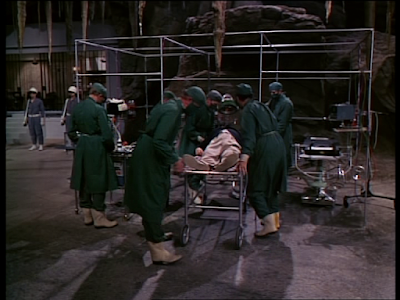











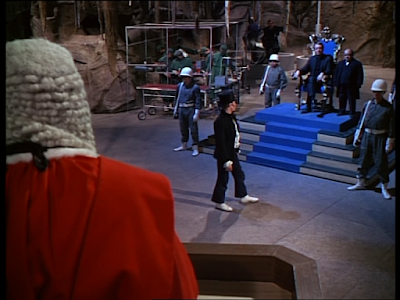


























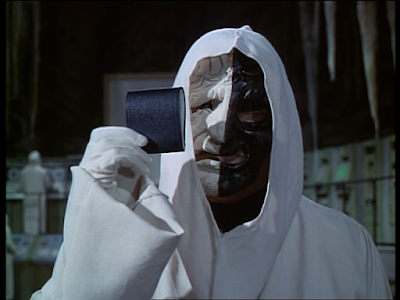






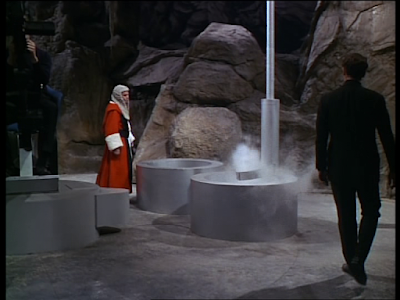





























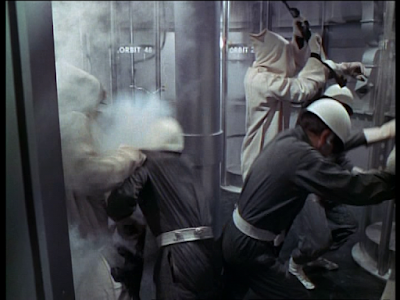








































Comments
Post a Comment
All comments welcome, you don't need a Google account, but trolls beware, all comments are moderated.